Bright lights of Detroit's 2024 NFL Draft a far cry from event's humble beginning
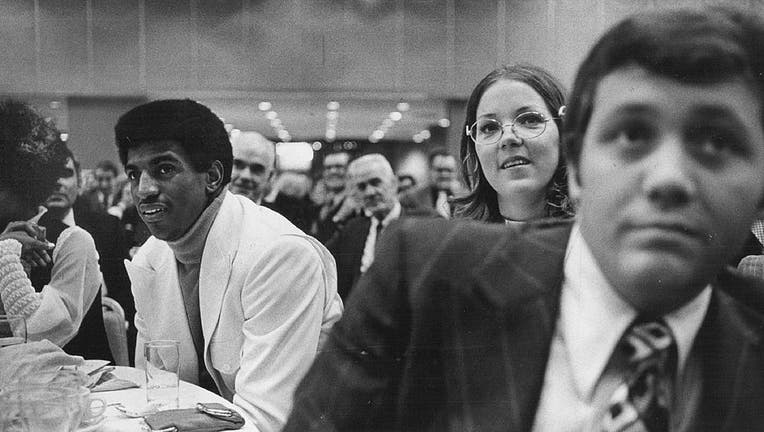
FEB 5 1973, FEB 6 1973; Armstrong, Otis - Groups; Not just another face in the crowd!; Broncos #1 draft choice, Otis Armstrong, sits at Bronco table.; Otis Armstrong from Purdue, the Denver Bronco's No. 1 draft choice in the recent draft of college f
FOX 2 (WJBK) - "Thirty-two teams, seven rounds, 224 young men who, today, are about to become players in the National Football League. A day where lives are changed. fates are decided, dynasties are born, and the clock is always ticking. Of course, I'm talking about... Draft Day." -ESPN's Chris Berman from the movie "Draft Day"
The NFL Draft lands in downtown Detroit for the first time and the next generation of future stars, role players - and yes, even busts, will be ushered in.
The draft - thanks in part to the soaring popularity of the NFL over the years, has become a sports calendar fixture and pop culture reference in commercials and movies.
But it wasn't always that way. The draft - which is actually called "The Annual Player Selection Meeting" began in 1936 - a full 16 years after the founding of the National Football League itself.
In some ways the seeds were planted in 1934 when the NFL started the waiver system with a selection order meant to help the worst teams first. Philadelphia Eagles co-owner Bert Bell had argued that the team's lack of success made it harder to sell tickets and make money, adding that even if the money allotment were all the same - players would still choose the winning teams over the struggling ones.
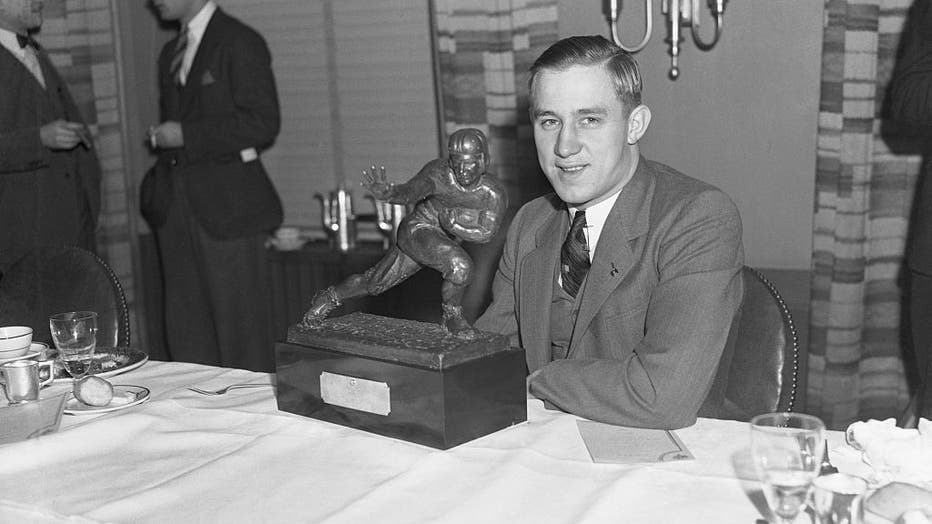
(Original Caption) New York: The All All-America of 1935--A close up of Jay Berwanger, ace backfield man of the University of Chicago, shown holding the bronze trophy of the downtown Athletic Club, with which he was presented today, December 10th, af
At a 1935 league meeting, Bell proposed that the NFL hold an annual player draft to level the playing field and to make sure every franchise remained financially viable. League owners voted unanimously to adopt his proposal, setting up the inaugural NFL Draft for the following year in 1936.
The first draft was far from the spectacle it is now, being held on Feb. 8, 1936 at Philadelphia's Ritz-Carlton Hotel with a pool of 90 available players. The list of eligible players was compiled from newspaper reports, visits to local colleges by team executives, and recommendations to front-office personnel according to NFL.com.
Bell's Eagles selected Heisman Trophy winner Jay Berwanger from the University of Chicago with the first pick overall, in the inaugural NFL Draft.
Ironically, he would never even play for the Eagles in the first-ever example of drama swirling around the top pick (which may have well been seeded in the event's DNA). Berwanger's choice however wasn't the most outrageous incident to occur, but set the pace for years later.
- In 1936 Berwanger quit football altogether and instead chose a career as a foam rubber salesman.
- First picks overall John Elway and Eli Manning each refused to play for the franchises that selected them (the Colts and Chargers), and forced trades following the 1983 and 2004 drafts, respectively.
- In 1991 Notre Dame star receiver Raghib "Rocket" Ismail was going to be the first overall pick by the Cowboys but decided on the eve of the draft to sign a then-record $26 million contract with the Toronto Argonauts of the Canadian Football League.
In a stark contrast to how pro football is thought of now, believe it or not, Berwanger in 1936 wasn't the only one to forgo an NFL career. Only 24 of the 81 players selected in the first-ever NFL draft went on to play in the NFL, instead opting for more secure professions.
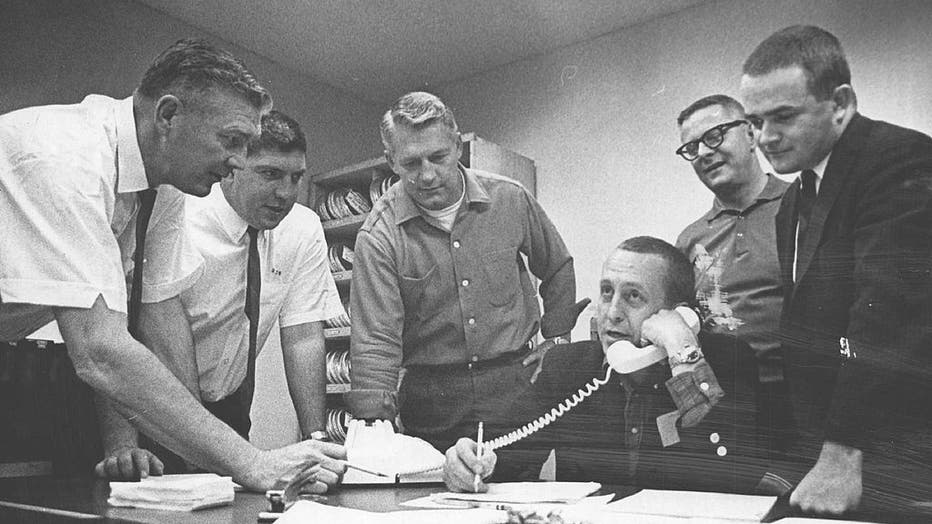
NOV 29 1964, NOV 30 1964; Broncos GM Operates From "Hot Line Central"; Denver Broncos General Manager Cal Kunz (seated) calls in a draft pick to American Football League headquarters in New York during Saturday's draft session at the Bronco office. W
In 1959 the upstart American Football League was born, creating a new competition for college players - and fought to keep the other each other from signing players after they were drafted.
This competition went on and salaries surged — until both football leagues agreed in 1966 to merge after the 1969 season, leading to a common draft.
The first televised draft came in 1980 on a brand-new little-known cable network, ESPN - despite then-commissioner Pete Rozell's skepticism that anyone would even watch. But the audience was indeed there.
It wasn't long before the stage, attention and atmosphere exploded in popularity as the news cycles grew with wall-to-wall coverage - first with cable television and sports networks, online sites and message boards, and more recently, social media feeding the frenzy for draft tidbits and insider information.
The first draft in 1936 had nine rounds, and a year later increased to 10. By 1939, it expanded to 20 rounds. In the 1940s, it grew to 32 rounds. After merging with the AFL, the NFL reduced the number of rounds from 17 to 12 in 1977.
More Draft coverage:
- 'In Brad we trust' - Holmes' draft accuracy proves elite for Lions
- NFL Draft's pick 29 in past 10 years shows Lions must navigate 1st round pitfalls
- With NFL draft in Detroit, Lions' GM Brad Holmes weighs trading out of 1st round
In 1993 the NFL trimmed the draft to eight rounds, and a year later settled on the seven rounds which it still uses today.
Until 2007, the limits were 15 minutes per pick in the first round, 10 minutes in the second, and 5 minutes for the remaining rounds. The league shortened things up by trimming the time limit between picks to 10 minutes in the first round, seven minutes in the second round, five minutes in the third through sixth rounds, and four minutes in the seventh round.
Another improvement came in 2010 with the draft moving from the marathon weekend format to a prime-time, more made-for-TV event that started Thursday night, aired the second and third rounds Friday and ended with the remaining four rounds all day Saturday.
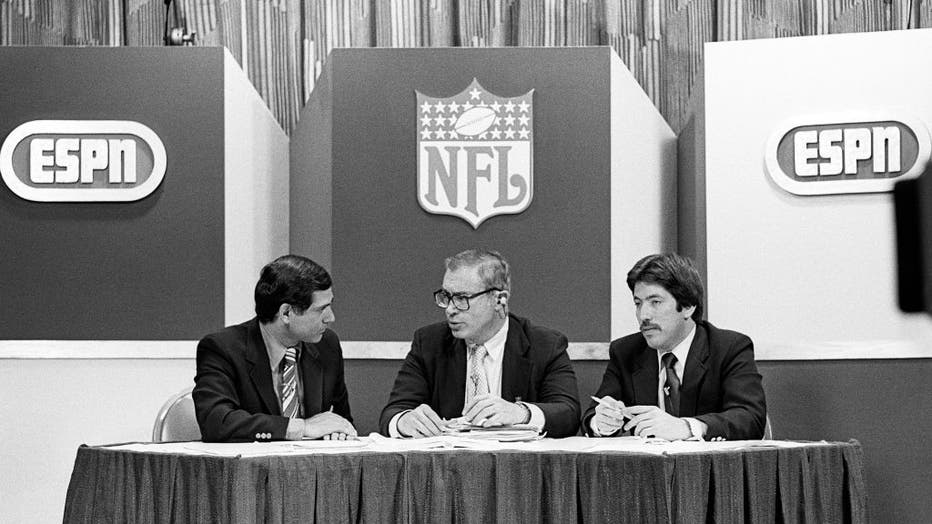
NEW YORK, NY - APRIL 27: (EDITORS NOTE: Image has been shot in black and white. Color version not available.) ESPN host George Grande (left) talks to analysts Paul Zimmerman (center) of Sports Illustrated and Howard Balzer of The Sporting News during
In 2015 the NFL Draft shifted from New York's Radio Music Hall home to going on the road for the first time.
Related:
- Lions 2024 redesigned uniforms released - including new-look blue helmet
- Where to park for the NFL Draft in Detroit
- NFL Draft: Where to eat, drink, and shop in Downtown Detroit
Chicago was chosen to host in back-to-back years before the draft then headed to Philadelphia in 2017 (somewhat poetically given the Eagles' involvement in the draft's creation) before the winding road finally came to Detroit.
Stay with FOX 2 for everything NFL Draft-related as we march towards April 25 and throughout the draft.
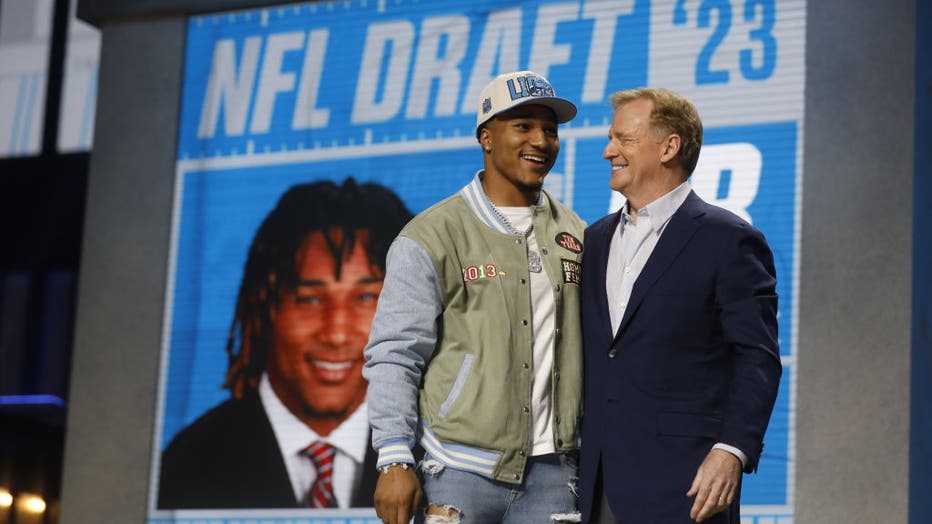
KANSAS CITY, MO - APRIL 28: NFL Commissioner Roger Goodell speaks with Brian Branch, selected by the Detroit Lions in the second round of the 2023 NFL Draft at Union Station on April 28, 2023 in Kansas City, Missouri. (Photo by David Eulitt/Getty Ima

